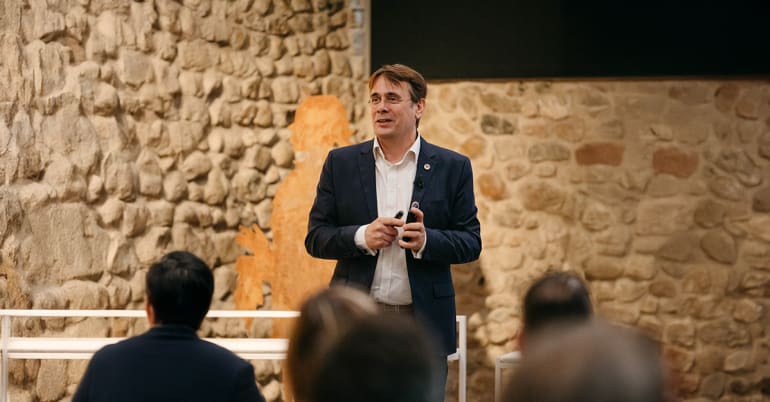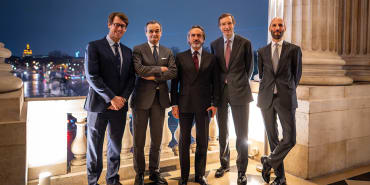How can a tax reform be turned into a competitive advantage? In the Canton of Vaud, are the planned reduction in income tax, the cut in wealth tax on tools of work and the increase in inheritance and gift thresholds enough to protect a family business? Could the federal initiative for large estates to be taxed at 50% jeopardise our businesses? And how should business owners prepare for the abolition of the taxation of imputed rental value or the potential rise in tax on pension assets? These were some of the many questions under discussion at the event organised by Lombard Odier – now a firm fixture in the diary for entrepreneurs in Switzerland – addressing the theme of "Tax and cybersecurity".
Over one hundred entrepreneurs – senior executives, company founders and investors – met at the prestigious Château de Prangins to address three key sets of challenges: the current and upcoming tax reforms, the conditions for passing on wealth under the current legal framework and the explosive rise in cyberthreats in Switzerland, which is prompting a fundamental rethink of companies' digital resilience.
As Antoine Buvelot, head of Lombard Odier's Swiss and international clients team in Geneva, stated: "Our objective is clear: to help entrepreneurs to protect and pass on their assets in an environment where tax rules and cybersecurity are evolving faster than ever."
2025 tax reforms: what exactly is changing for entrepreneurs?
Samuel Meylan, head of tax and legal advice for clients resident in Switzerland at Lombard Odier, reviewed the three central measures adopted by the Canton of Vaud. The first is the income tax cut. "A four percentage point reduction in the basic rate, which corresponds to an effective cut of around six percentage points once the cantonal coefficient is applied," he explained. However, Meylan warned that this measure does not apply to the taxation of lump-sum benefits (capital) paid out by pension funds, which are already the subject of a special allowance.
From January 2025, every parent is able to give each child up to CHF 300,000 p.a. tax-free, while the inheritance threshold per line of inheritance has risen from CHF 250,000 to CHF 1 million
The second major reform is a reduction in the wealth tax applying to tools of work. Lea Baracchini, wealth planner at LO Patrimonia, explained that this mechanism enables taxpayers to claim "a reduction in wealth tax in relation to tools of work of between 30% and 40%"1, provided that three criteria are met. "They must hold at least 10% of the company in their private assets, perform a management role remunerated at market rates and proactively make this request using a dedicated form." Baracchini also stressed that this relief is not automatic: "The authority will not apply it to you as a matter of course. It is up to the taxpayer to submit a request and demonstrate that the eligibility criteria are met."
See also: Senior executives: a practical guide to planning your retirement and optimising your assets
Lastly, the tax-exemption thresholds for gifts and inheritances in the direct line of succession have been raised significantly. "From January 2025, every parent is able to give each child up to CHF 300,000 p.a. tax-free, while the inheritance threshold per line of inheritance has risen from CHF 250,000 to CHF 1 million"2, explained Baracchini.
Tax shield: uncertainty and guillotine clause
The Canton of Vaud's tax shield plan, which is due to enter into force on 1 July 2025 but remains conditional on the outcome of the vote on the "12%"3 initiative and on the appeal currently pending before the Constitutional Court, further illustrates the current complexity of the tax system. Samuel Meylan highlighted the presence of the "guillotine" clause: "We have a very interesting new tax shield, but if the people of Vaud approve the cut in income tax and wealth tax to 12%, the blade will fall on the tax shield. That is what the legislator intended."
Samuel Meylan reminded listeners that the initiators had vehemently criticised this logic, regarding it as unacceptable political pressure: "They lodged an appeal with the Constitutional Court, arguing that this clause was tantamount to blackmail." No decision has yet been made, leaving business owners to grapple with uncertainty. This is certainly a topic to keep a watchful eye on.
Passing on businesses: welcome relief, but federal vigilance
The new cantonal rules simplify the process of passing a business on within the direct line of succession. The 50% relief on the value of the company is maintained, and the minimum holding requirement is down from 33% to 25%, as Lea Baracchini explained: "To be able to make use of this relief, the child must own at least 25% of the business after it has been transferred." This adjustment will ease the fiscal pressure on numerous entrepreneurial families.
See also: Four steps to a successful business transfer in Switzerland
However, these cantonal advances risk being undone by action at the federal level. The first such development is a proposal to raise the tax on lump-sum benefits paid by occupational pension funds, which would go up from 9% to around 14% or 15%.4 The second is a popular initiative by The Young Socialists Switzerland party, which seeks to bring in a 50% federal tax on gifts and inheritances in excess of CHF 50 million.5 "The text does not include any kind of relief for tools of work, which could cause serious liquidity problems for business heirs," warned Baracchini.
Cybersecurity: As attacks escalate, how can you protect your business?
Following the talks by Samuel Meylan and Lea Baracchini, Frans Imbert-Vier, a cybersecurity expert and the CEO of UBCOM, shared his knowledge about new forms of cyberattack and explained how entrepreneurs can better protect themselves and their businesses. He set the tone right from the outset, declaring: "Out of all the companies that have been hacked and didn't have robust backups in place, 95% were unable to recover," adding: " What you are holding in your hand right now, your smartphone, is the biggest Trojan horse you've ever used ."
Out of all the companies that have been hacked and didn't have robust backups in place, 95% were unable to recover
So, how should you respond if someone encrypts your company's servers overnight? Could you actually use your backups? Can you really have faith in your communication tools, your employees or even your suppliers? These are critical questions for entrepreneurs, which Imbert-Vier addressed within a context where cyberthreats have become structural and systemic.
In 2023, 45% of Swiss companies employing over 250 people fell victim to at least one cyberattack
In cold hard numbers, 45% of Swiss companies employing over 250 people fell victim to at least one cyberattack in 2023.6 And according to the National Cyber Security Centre, 34,789 incidents were recorded in the first half of 2024 – nearly double the figure for the same period in 2023.7
One of the first observations Imbert-Vier made was that in the majority of cases, attacks are attributable not to technological failure, but to human error. " 80% of company hackings are achieved via phishing8," he declared, reminding attendees that "your brain is better than any firewall. If you spot any anomaly in an email or message you receive, however small, don't click on it."
Imbert-Vier illustrated this point with numerous real-life examples: time-pressured employees who click despite harbouring some doubts, computers left unsupervised and confidential conversations overheard in taxis or airport lounges.
No restoration without a backup
For Imbert-Vier, the only genuine protection is resilience, which above all means having a dependable backup. "A backup is the only element that will enable you to pick up your activity again after an attack. Nothing else will achieve this," he insisted, adding that "out of all the companies that have been hacked and didn't have robust backups in place, 95% were unable to resume their activity as before." Imbert-Vier also advocates for the adoption of tracking tools, "so that you know who is using what file and when; without that, it's impossible to press charges, and without that, no insurance will cover your losses."
"We have to overcome our digital naivety and opt for genuinely European solutions, by which I mean firewalls, sovereign clouds and AI tools built and operated on European soil."
Imbert-Vier also warned against the false sense of security that can come with certain mass-market services: "Every time you use a US product, you accept that your data could be intercepted," he explained, citing the CALEA Act of 19949, which authorises the US authorities to access data without going through the courts. His advice to business leaders was unequivocal: "We have to overcome our digital naivety and opt for genuinely European solutions, by which I mean firewalls, sovereign clouds and AI tools built and operated on European soil." Why? Because "a product that is installed in Europe is not necessarily European in the laws it must follow or its ownership structure."
Cybersecurity and entrepreneurs' assets – from corporate culture to tailored support
The conference concluded with a Q&A session for the panel, during which one participant asked Imbert-Vier about the usefulness of a state-certified digital identity. The UBCOM CEO recognised that "for private users, yes, that would improve security," but argued that it is inadequate for professional activities, particularly in innovative fields or in finance. He stressed that a large number of solutions that are presented as Swiss "are financed in part by American capital. But once a company holds more than 25% of a venture, it has a claim on the intellectual property. That's not a technical question, but a geopolitical one."
Cybersecurity is not a suite of technical measures, but a culture, incorporating everything from awareness-raising among teams and rules of use to regular training and vigilance adapted to every individual's access
Imbert-Vier concluded the Q&A session with a series of simple but essential rules to follow: never use public USB ports, never leave devices unsupervised and always switch them off (rather than putting them on standby), or indeed avoid using free public Wi-Fi networks altogether. "If you have a doubt, do nothing: don't click, don't connect, don't transfer anything. This precautionary principle is your best form of insurance", he stressed.
Finally, he directed a warning to the financial directors who are often the target of phishing attacks: "You are the ideal springboard for fraudsters: learn to say no and avoid anything that looks odd." He finished with the reminder that "cybersecurity is not a suite of technical measures, but a culture, incorporating everything from awareness-raising among teams and rules of use to regular training and vigilance adapted to every individual's access." For entrepreneurs, navigating this cultural shift requires having partners on board that can make the connections between digital governance, wealth strategy and operational management.
That is precisely where Lombard Odier comes in. By combining local expertise with a 360° view of wealth, Lombard Odier supports Swiss entrepreneurs every step of the way, from the company's creation to its growth, and ultimately its sale or transfer. This customised approach, combining wealth advisory with corporate structuring, succession planning and tax optimisation, allows Lombard Odier to effectively bring together the private and professional strands of wealth at every stage in the lives of entrepreneurs and their families.





share.